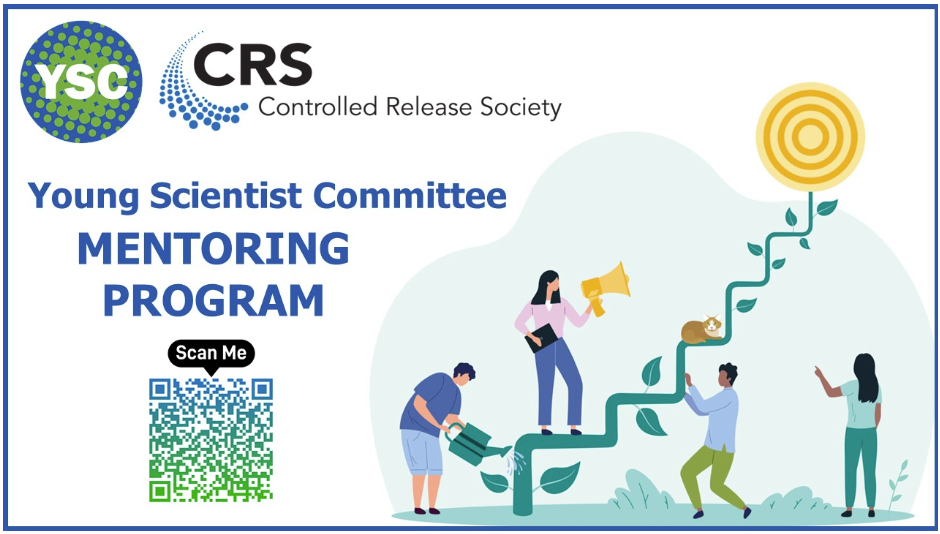Using Mentorship to Develop Your Global Network with CRS Young Scientist Committee

When Joanna Sadowska was a senior scientist in Ireland and I was a fifth-year graduate student in Seattle, Washington, we were matched as a mentor-mentee pair in the CRS Young Scientist Committee’s inaugural Mentoring Program. From March to September, we met monthly to discuss my career goals. For me, those months were marked by many transitions – I started a postdoctoral position, I relocated across the country, I found my footing in a new research area. I was grateful to talk and troubleshoot with Joanna, as she’d recently been through those transitions herself. Now, four years later, we still meet every couple months to help each other through new career challenges and we look forward to catching up in person at CRS Annual Meetings.
Joanna and I are one of many success stories of the YSC’s Mentoring Program over the years. The program, which started in 2021, annually matches 50-60 people into mentoring pairs. Participants must be members of CRS or a Local Chapter. “We designed this program to support young scientists with where they can take their career,” Tushar Kumeria (Associate Professor, University of New South Wales) told me. “Having a mentor also helps mentees build their networking power, because once you’re in touch, it’s easier to reach out when future needs come up.”
Dr. Kumeria was part of the team that began organizing the first iteration of the Mentoring Program in 2021, along with Chelsea Thorn (Principal Scientist, Genentech), Chiara Bastiancich (Senior Scientist, French National Centre for Scientific Research), and Juan Aparicio Blanco (Associate Professor, Complutense University of Madrid). The team set out to revive a mentoring program that had been previously part of CRS but was no longer active. The new program is meant to formally run for 5 months, during which the YSC checks in with mentors and mentees by surveys, but is otherwise largely self-driven by each mentoring pair.
An organizing team of five YSC members handles all registrations, the mentee-mentor matching process, and feedback surveys, as well as continually looking for opportunities to improve. This year, about 55 people are actively involved in the Mentoring Program. Most (80%) participants are in academia, but there is a demand for increased industry representation. “We’ve noticed that mentees, especially those wrapping up their PhDs, are showing a growing interest in industry. In fact, 35% of them are now specifically looking for industry-focused mentors,” noted Toni Guillot (Assistant Professor, University of Valencia), a member of the program’s current organizing team. This year, the team focused on expanding its outreach to industry mentors by engaging with CRS’s Industry Foresight Council, which has led to a significant increase in the number of industry participants.
The mentoring program not only represents diverse career paths but also scientists from many different areas of the world. “We have strong geographical diversity in mentors and mentees. In our registration survey, we ask where mentees are from and where they want to go, and we try to find them a mentor in their target destination,” Dr. Bastiancich explained. Often, these connections help young scientists learn practical information and start building a professional network before their next move. “No one is left behind; if a young scientist is from a low- or middle-income country, they can participate without paying CRS membership, thanks to support from CRS leadership,” Dr. Kumeria added. One of the team’s goals is to continue and grow their partnerships with Local Chapters so that more young scientists are aware of this opportunity.
Another recent effort has gone towards organizing an in-person event for mentees and mentors in the program. This year, the YSC will be organizing a Mentorship Event which involves a workshop on best practices in mentoring, such as designing an individualized development plan that is tailored to the specific needs of the mentee. This will also be the first in-person event where mentors and mentees from the YSC Mentorship Program can meet.
Overall, the program runs smoothly and is highly reviewed by participants. “What started as a pilot program in 2021 has now grown into one of the most successful programs run by the YSC,” said Hagar Labouta (Assistant Professor, University of Toronto), who currently serves as YSC Chair. “It takes a lot of time and effort to run the mentoring program, but it has a big impact for young scientists, and it gives mentors an opportunity to have a global impact.”
All young scientists are encouraged to register for the program. “I’ve applied to be a mentee this year,” said Melitini Koutsoviti (PhD candidate, University of Copenhagen), who joined the program’s organizing team this year. “Most people my age are lacking some insight from people in the next career stages. From what I’ve seen, [the organizing team] is really working to match you with someone who understands your needs and can help you.” Dr. Guillot also points to a need for male mentors: while the mentee pool is diverse, about 80% of the program’s mentors are women. “We are continuously encouraging more men to step up and take on mentorship roles.”
Anyone interested in joining the 2025 Mentoring Program cohort should email Dr. Guillot (antonio.guillot@uv.es) and Dr. Bastiancich (chiara.BASTIANCICH@univ-amu.fr). Follow CRS_YSC on Twitter for regular updates on the mentoring program and other activities.
Andrea Joseph (Twitter, LinkedIn) is an Assistant Professor at Syracuse University.

